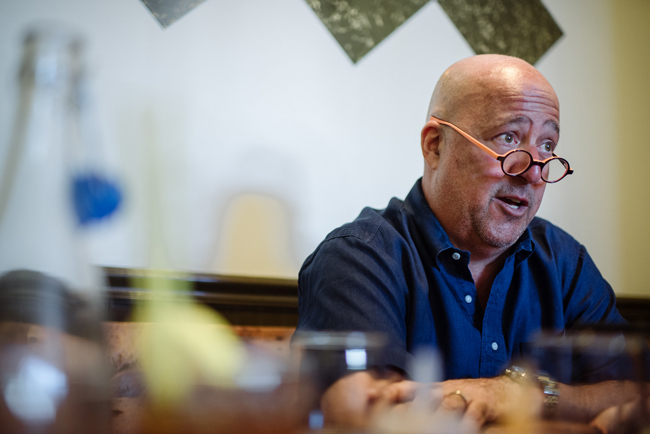
Andrew Zimmern needs little introduction. He’s one of the biggest stars in the supersaturated world of food media, most famous for his long-running show on the Travel Channel, Bizarre Foods, which is approaching its 300th episode. When he’s not traveling the world, Zimmern is a serial entrepreneur, starting businesses nationally and locally — in Minneapolis, his AZ Canteen has been serving food at Target Field since the stadium opened, and it’s the marquee food brand leading the charge at the newly opened U.S. Bank Stadium.
Earlier this year, we attended the Target Field food preview and came away unimpressed with the new sandwich Zimmern was presenting from AZ Canteen (“Seriously, Mr. Zimmern: Tell me it tastes any different from a McChicken doused in Palmolive dish soap.”). After a few tweets, Zimmern gamely agreed to sit down with Heavy Table for a lunch interview at Revival in South Minneapolis (which is also represented at U.S. Bank Stadium), where we talked at length about the challenges of creating stadium food, being a globally recognized celebrity, politics, the history of the Twin Cities food scene, his passion for storytelling, and more.
HEAVY TABLE: Thanks so much for sitting down with me here at Revival. This is the only way I can get in here without waiting four hours …
ANDREW ZIMMERN: I kind of act like this is “my” table. [chuckles].
HEAVY TABLE: So this is always roped off just for you?
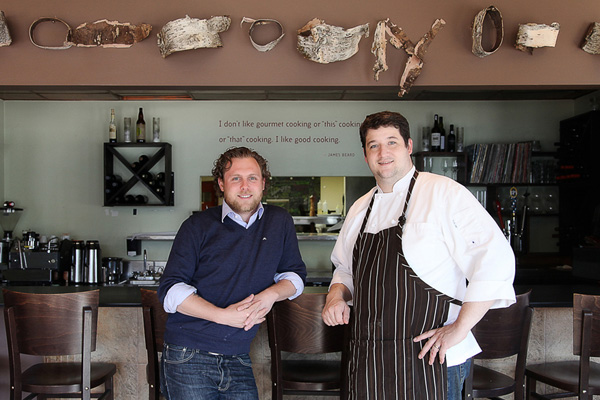
ZIMMERN: Right! [laughs] No, it’s nice. I like to come here. Nick [Rancone] and Thomas [Boemer] are friends of mine, and we get to work on some fun things together sometimes. So if I call — and everyone knows this happens — I try to be transparent about it. There are a lot of other people who do what I do who are like, “Oh no, I’m treated the same when I walk into a restaurant, …” which is such bullshit. First of all, it’s uncomfortable, sometimes, to walk into a restaurant because it’s a constant parade of people wanting a picture or an autograph, which is great, but when I’m there trying to have lunch with my wife, trying to discuss kid issues —
HEAVY TABLE: You need a little space sometimes.
“I LOVE TALKING ABOUT EATING BUGS!”
ZIMMERN: Right, it’s just … the drunk guy at night wandering over and wanting to ask a hundred questions; it’s just like come on!
HEAVY TABLE: “Hey man, what kind of bugs you eatin’?”
ZIMMERN: Right. Well, I hear that ten times a day, and it’s — The only people who say it are people who are so stupid, they think they just thought of that and it’s hysterical. It’s a self-selecting kind of thing. It’s a predictor code for Social Darwinism. I mean anyone who asks me, when I walk by, [affects a redneck voice] “Hey, there’s nothin’ weird to eat here, heh heh —” they just think it’s hysterical, and I’m just like, OK, that’s a stupid person.
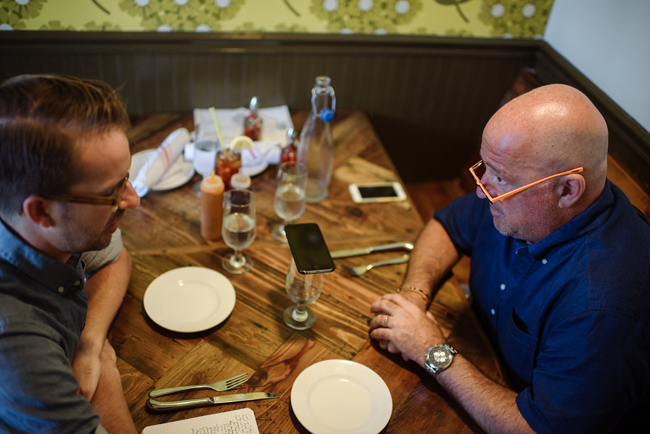
HEAVY TABLE: Well, if it makes you feel any better, I don’t want to talk to you about eating bugs at all.
ZIMMERN: No no no! I love talking about eating bugs! I think it’s a very important thing, and it’s getting bigger. I think the issues obviously are many here in this country, where it’s not part of our tradition; there’s not fresh bug farming going on to the degree that there will be in ten years — we’re just figuring it out. And once we do, once we figure out the different bugs that can be — you know right now we’re just growing things that can be ground up and used as protein powder or flour, and that’s great — but I actually think that bugs grown as food —
Look at a shrimp. I’ve had the opportunity to eat giraffe weevils in Madagascar. And sauteed in butter, they’re indistinguishable from seafood, if you close your eyes. Crunchy, meaty on the inside, just a fantastic animal, and there’s lots of other bugs like that in the world that can be grown for food quickly and cheaply. You know, it’ll happen.
HEAVY TABLE: It’s probably going to have to happen —
ZIMMERN: Well it will. I just saw yesterday on civileats.com — a global study — that 54 percent of farms do more harm than good. To the ecosystem, the local biosphere that they exist in. Now, as the planet grows, as the food need grows — global warming plays havoc with weather, arable land decreases. I know it sounds weird, but if you want to help farms and feed people, we need to be doing city planning better. To give you an example: If in Minneapolis and St. Paul, if we continue to spread out horizontally, we are going to start eliminating the watershed, arable lands, and encroaching — I mean we’re flat here. Minneapolis could stretch in 100 years from Duluth to Rochester.
However, if we grow vertically, and densely pack our cities the right way, and handle transportation hubbing the right way, we will end up with more arable land, and preserve more natural resources. And that’s crucial on a hundred different levels. So, this is why people who love food need to become more politically aware, more socially aware, more conscious about sustainable living, rather than just sustainability. I run into this all the time on my social media, when I talk about politics, and people are like, “Stick to TV, you big fat fuck!” I mean, that’s a real quote —
HEAVY TABLE: I’m writing that down.
ZIMMERN: You know, [people say], “I don’t come to your Twitter for opinions.” I think opinions are good! I think we need to be talking more. I think for people who love food — the reason I’m so insistent on the national conversation on lots of topics is that for the first time, thanks to this food-as-rock-star phenomenon (at no time in global history has any civilization been as in love with food as Americans are in 2016), we are in a romantic period when it comes to this, so I’m trying to harness that energy and interest in something other than how to cook a good Wagyu steak. Because, at the end of the day, as someone who’s spent their life in food — the world is not made up of food. The world is made up of people who need love and attention. So through food, I think I can get people on my side with that, which is why I make the show I do.
“WE’RE A FUCKING MESS HERE”
HEAVY TABLE: You came around to the back end of what I planned to ask you, which is how does your global viewpoint and experiences — which are super rarefied compared to most people in the world — how does that inform your thoughts on Western food attitudes, or our culture of wastefulness, or —
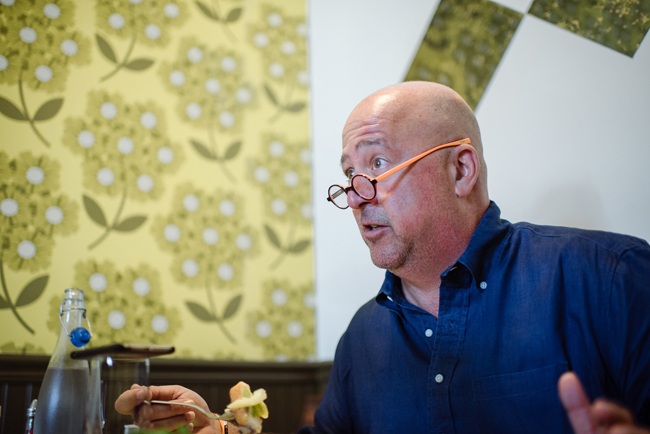
ZIMMERN: Oh, we’re a fucking mess here. In America, nobody wastes more food, nobody fetishizes food, nobody has a bigger problem with food from a heath and wellness standpoint, everyone tends to point the finger at other countries. The one I heard recently is “Well, at least we’re not Mexico —” And why do we always pick on Mexico? “They have dialysis centers opening left and right; you know they’re all addicted to sugar. …” You know something? We have WAY more of a problem with food — not only do we have the same sugar problems, body image problems, but worse — eating well in America is a class-privilege issue. It is frightening how fucked up our food system is. So, the key to that is politicizing it. In other words, through legislation, we can get people talking about kitchen-table issues and actually get them on someone’s agenda — there’s not been a single candidate to date talking about real issues. I’ve still not heard from Secretary Clinton or, you know, Reality-Star-TV-Business-Maven Trump — because we have to give him a title —
HEAVY TABLE: Yeah, he needs a title — formality is important here, it might as well be that.
ZIMMERN: Correct, call it like it is. I still haven’t heard from either of them about where they stand on national school lunch programs, which were destroyed in the Reagan era. I mean, those are the things that are important to me.
HEAVY TABLE: Right. And we’ll probably get flamed super hard on the internet for this, but the number of times these candidates get asked about their faith, or how their faith informs their choices. There was a great post from Dan Rather today that made my heart sing, but also made me feel so horribly, crushingly sad on the inside, where he said he’d love to see the candidates get asked about their views on science — I mean, he was basically getting at kitchen-table issues from this angle. There are candidates who dismiss climate change, or whatever, and the way it all connects … and food, as a lens, it amplifies and magnifies all of these things.
ZIMMERN: Correct. Correct. food is a cultural constant that allows us to explore so many of these issues. You know, we have one in five Americans going to bed hungry at night. We waste 40 to 42 percent of our food, depending on who you talk to. The number is higher when it comes to fresh vegetables and fruit, right? Which everyone says we need to eat more of. You know, it’s crazy, and the science — and I’m just talking about pure science right now — the University of California at San Francisco has one of two publicly funded research arms that do nothing but study food. And they have a bunch of websites, including one called sugarscience.com. I’m just going to assume, from an endocrine and hormonal standpoint, that you’re an average American for your age. You can have nine teaspoons of sugar per day, and your body can process it and tolerate it pretty easily, right?
HEAVY TABLE: Perhaps.
ZIMMERN: But if you drink a 16-ounce Coca-Cola, you get more than that. And by drinking it, you force it through your system so quickly that your liver and your endocrine system and everything can’t handle it. The stress you put on your body, when you do it a few times a day, what it does to the digestive system, is crazy. So, you know, as someone who’s recently going sugar free — the science behind this stuff is so insanely provable and mountainous, and yet, it’s illegal for someone to sell a joint at my kid’s elementary school. If someone came to my kid’s school and sold a marijuana cigarette to someone, they would be thrown in jail, and the shame … but Coke machines line the hallway, and chocolate milk is given out for free, and they encourage it — and orange drink, which falls under the “fruit juice” category — as in F-R-O-O-T.
HEAVY TABLE: Wasn’t it Reagan who famously said that ketchup in school lunches should be considered a vegetable?
ZIMMERN: Well yeah. There’ve been a lot of problems there. Lots of issues, and very, very important —
[food arrives, much ooh-ing and ahh-ing commences]
ANDREW ZIMMERN THE BRAND AND ANDREW ZIMMERN THE PERSON
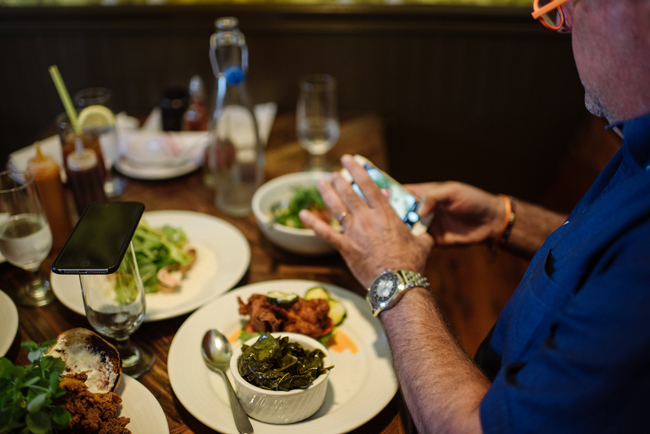
HEAVY TABLE: Last time I came to Revival was on their opening day — I am so happy about this.
ZIMMERN: [taking photos of every dish on the table] I obsessively photograph my food —
HEAVY TABLE: Me too. It’s a sickness. I’m excited about this pickled shrimp —
ZIMMERN: It’s delicious.
HEAVY TABLE: It’s great to hear how you’re trying to leverage your position as a highly visible dude who’s involved in tons of stuff, and — globally, locally, nationally, it’s time to start bringing those conversations to the fore. I’m guessing it’s a challenge for you to balance where you —
ZIMMERN: How so?
HEAVY TABLE: Well, I mean where Andrew Zimmern the brand and Andrew Zimmern the person I’m talking to right now — if there’s a blurry line there, or if you consciously switch modes, or you try to unify —
ZIMMERN: No. Purposefully, intentionally, since day one, I’ve tried to be one person. We’ve never met each other. Usually when people meet me, and we spend an hour talking, like we are, they walk away — I’m the same person on TV that I am in real life. I’m the same person everywhere. To not show up as yourself in life everywhere, is a mistake. I have lots of TV friends who are acting on television, and I feel really sorry for them. Because the energy that that takes to do, I can’t even imagine. So much so that I won’t even go there. So, I really believe in just being one person, and being the same all the time — life’s so much easier that way.
HEAVY TABLE: Sure. The integrity is something that carries through.
ZIMMERN: That’s true. The issue for me has only grown more serious as I’ve gotten more popular or successful or whatever the word is, … and the reason is, if you have a large platform, and you’re not using it for good in the world, you’re a scumbag. Sorry. I just can’t think of anything more irresponsible.
HEAVY TABLE: I used to read your blog back when that was more active, ten years ago or so — and it’s been good to see, over time, how you’ve been embracing and supporting the Twin Cities food scene at the same time as you’re off on these massive adventures —
ZIMMERN: I wish I could embrace the Twin Cities food scene more! My big thing is that I can’t embrace the food scene here in the way that I’d like to, because I’m away 250 days a year. What I can do for the Twin Cities food scene is say things out loud when I have the opportunity, when I’m here. Whether it’s the quality of the food here at Revival, or the pretend bullshit I see in other places, or it’s some perspective to remind people how the rest of the world views us, or where we fit into the world … because I’ve been around for a while, and I’ve been around and alert for a while. So, I’m not short on opinions.
A FIVE-MINUTE HISTORY OF MINNEAPOLIS-ST. PAUL FOOD
HEAVY TABLE: Obviously, the local dining scene has gone through a lot recently — there have been a lot of changes in the 20 years or so since you left [as head chef of] Café Un Deux Trois, from the rise of the chef-driven neighborhood joint like this [Revival], to places like La Belle Vie disappearing, and fine dining taking a nosedive, and the rise of food trucks, and this general flourishing across a large spectrum of smaller, more specialized businesses. What’s your take on it all?
ZIMMERN: So, my five-minute history of food in the Twin Cities —
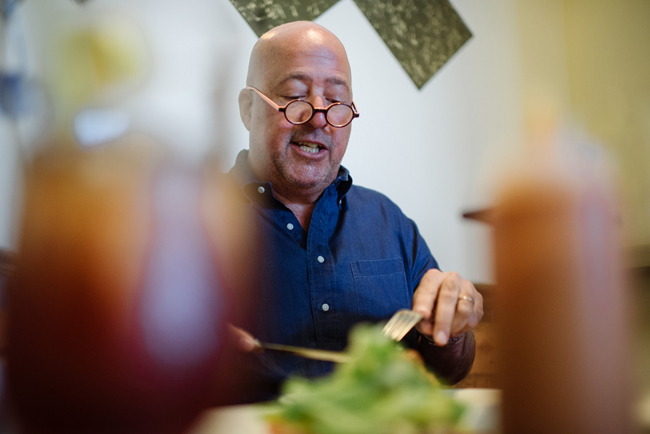
HEAVY TABLE: Sure! Or 20 minutes, or 25 —
ZIMMERN: So, when I arrived here in 1992, there was Goodfellows and Tejas. There was D’Amico Cucina. There were a handful of restaurants doing serious food. And downtown started to boom a little more. New buildings. [Café] Un Deux Trois opened downtown. You had Aquavit come in. Nowadays, downtown has really become a culinary wasteland. Mostly because people just service lunch customers, and conventioneers, and pre-sporting events. So, you know, Kieran’s [Irish Pub] does boffo numbers, and restaurants like Vincent can’t afford to renew their lease, or whatever story they’re spinning there. For the length of his lease, Vincent Francoual made fantastic food in a beautiful space, and it was just no longer viable for him to do it.
That will change over the next ten years. And the reason it’ll change is the exact reason restaurants in the neighborhoods have flourished. When the economic downturn forced a lot of restaurants to close, a lot of chefs and cooks woke up to find that there was a revolution going on in America, and people were loving food more than ever. A lot of them [chefs] left, came back — some stayed — but they all opened smaller restaurants in the neighborhoods.
I always call it the John Dillinger School of Restaurateuring. Famously, when asked why he robbed banks, Dillinger said, “Because that’s where the money is.” You should open restaurants where your customers are — something that most restaurateurs have to learn the hard way. So, all these smaller places started opening up with great success — chefs having more control over their products, economics making more sense, lower rents, the right size kitchen-to-table ratio, the right menu prices. Everything started to work a little better. What we’re going to see happen over the next ten years is the rebound — these restaurants won’t close, because people are living there. Some may come and go; others will take their place — but downtown, can you name one good restaurant downtown [right now]?
HEAVY TABLE: Hmmm —
ZIMMERN: I’m not talking about the warehouse district.
HEAVY TABLE: I honestly can’t. The last one was maybe Vincent? There are signs of life in the skyway, but maybe that doesn’t count —
ZIMMERN: Skyway doesn’t count to me. Constantine and Monello — I thought they had a chance, simply because some of the people involved there were brilliant. But those didn’t work, right? [Editor’s note: The marketing director for Jester Concepts emailed us to state that: “Monello & Constantine are still currently in business and are a successfully operating restaurant and cocktail bar”]
HEAVY TABLE: Yeah. Then you have Scena and Parella in Uptown. There’s kind of a relationship, I think, between this older model of going out to find an investor, a huge pot of money, and open a place with like 300 seats — and that just doesn’t seem to be working anymore.

ZIMMERN: Right. And that’s what failed for years downtown — and it spurred the creation of places like Piccolo, and Tilia.
HEAVY TABLE: Sure. Steven Brown and Doug Flicker sort of saw the writing on the wall.
ZIMMERN: Two of our best chefs left places they were in. Doug, by the way, at the time was cooking at Mission American Kitchen — but now is probably one of the most undervalued chefs in the country, in terms of national attention.
HEAVY TABLE: Not to mention the influence he’s had on a whole newer generation of chefs.
ZIMMERN: Oh yeah. So, I really do think someone — some landlord, downtown — is going to come to someone … could be someone like me, or Doug, or Steven, or any competent, proven food person, and say, “I want to do a restaurant in that space on Ninth and Marquette,” or whatever. Not in a hotel, like Manny’s, Constantine, Monello, or those other places where they can subsidize the food. And someone’s going to say, “That’s great — let’s do what has worked in the warehouse district and the neighborhoods, let’s go with something smaller, a little less ambitious.” You know, I would love to see a restaurant like Meritage, simple —
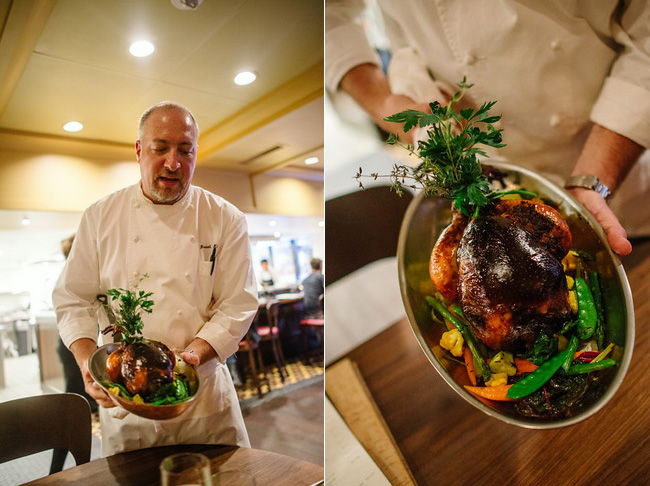
BECCA DILLEY [photographer]: I mean, Brasserie Zentral was amazing …
ZIMMERN: Zentral was not amazing. Zentral was a clusterfuck.
HEAVY TABLE: Hey, Zentral made some amazing food. Operationally, I can’t speak to that.
ZIMMERN: I ate there. And I thought some of the food Russ [Russell Klein, chef / owner of Meritage and Brasserie Zentral] was doing was brilliant, and some of it was very good. The room was wrong; the location was wrong; the design was wrong —
HEAVY TABLE: It was pretty ambitious.
ZIMMERN: But not ambitious in the right way. I think Russ and his wife [Desta Klein] are amazing restaurateurs. I mean look at what they did down at Meritage, look at what they did with the oyster festival. It’s [Brasserie Zentral] a typical misplay when you look in comparison to what Gavin [Kaysen] did at Spoon & Stable. Gavin read the tea leaves the right way, and he said people want a certain kind of environment, presented a certain way, dressed up in certain clothing. They want to be made to feel like they’re a part of something cool and special. No one ever walked into Zentral and thought that they were a part of something cool and special, as a consumer.
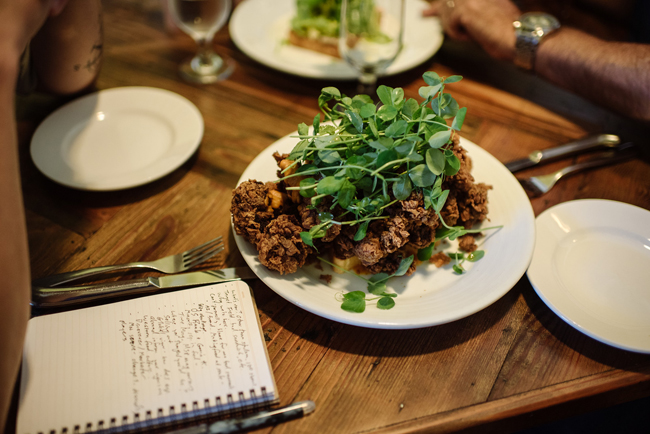
HEAVY TABLE: So now Blue Plate Restaurant Group is going to be doing something in the old Zentral space, right? So do you think they’ll be successful? Blue Plate brings a more suburban vibe —
ZIMMERN: Blue Plate will do something there that will crush with lunch, and they have enough costs spread out across their company. Remember, every restaurant has to survive on its own. Usually they’re independent LLCs. You do have cost benefits when you own more than one place. From training, to food purchasing, and on down the line.
HEAVY TABLE: It’s an economy of scale.
ZIMMERN: Yes. They will figure it out. The people at Blue Plate are super smart — they’ll figure out a downtown restaurant for that space. Do you know where Steven Brown’s new restaurant is?
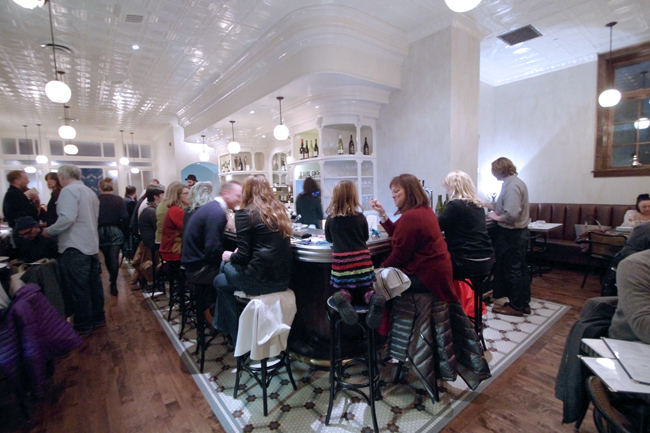
HEAVY TABLE: Sure, St. Genevieve, over on 50th and Bryant —
ZIMMERN: Let’s say Zentral opened tomorrow in that space. With that sort of simple look and feel, and a hook — like the fun champagne bar, a cool hook that makes people feel special and welcome. They’d be open there for 15 years.
HEAVY TABLE: I think that’s a good segue into a conversation I’d love to have about what spurred this interview to begin with, and that’s —
“DIDN’T YOU CALL ME OUT?”
ZIMMERN: Didn’t you call me out?
HEAVY TABLE: I did call you out!
ZIMMERN: Didn’t you call me out on some brilliant opinion of mine that you took umbrage with?
HEAVY TABLE: No, no! I took umbrage with a sandwich I had of yours [from AZ Canteen] at the Target Field food preview — and I didn’t think it was very good. But I’ll say this first: All the food I’ve had in the past from the AZ Canteen truck has been good, and I —
ZIMMERN: No! You don’t need to editorialize it —
HEAVY TABLE: No, I know! This is what I’m saying —
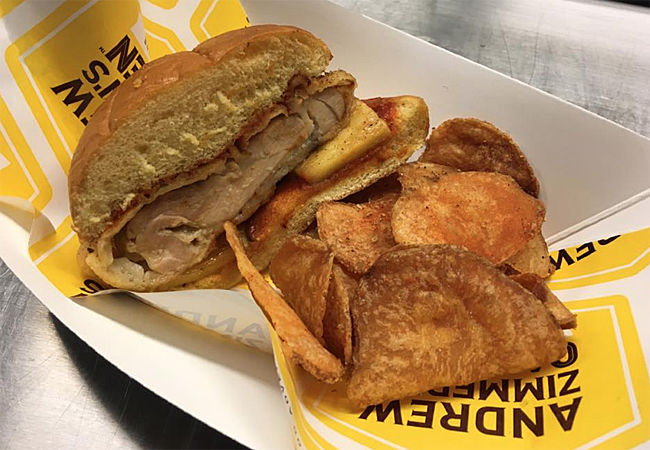
ZIMMERN: You got a shitty sandwich.
HEAVY TABLE: I did eat a shitty sandwich, it’s true.
ZIMMERN: Which is a really fucked up thing! No one should get a shitty sandwich with my name on it. I don’t care where you are; I don’t care where I’m serving it —
HEAVY TABLE: But when you responded [to the story] on Twitter with that same exact sentiment, it was cool. You took ownership, and said that no one was more disappointed than you. In the story, I said something to the effect of challenging you to look me in the eye and tell me you thought it was a good sandwich. … And to be frank, with you being a celebrity, it’s easy to pick on the big guys —
ZIMMERN: And you should! Absolutely!
HEAVY TABLE: Like, if you can take a bite of this and look me in the face and tell me you think it’s good, then, well, we should check that out and talk about it.
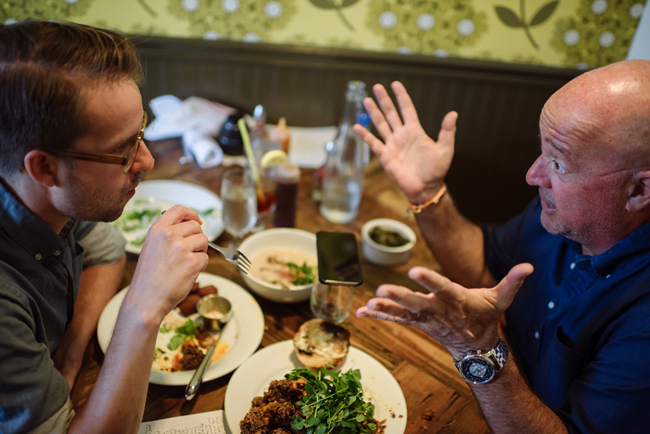
ZIMMERN: One of my friends owned St. Albans Boathouse at one point. This is going back 23-24 years.
HEAVY TABLE: Out on Lake Minnetonka?
ZIMMERN: Yep. He had someone make a seafood salad, and it was in their to-go case or whatever, and my friend — the owner — walked in one day and, you know, looked at this clearly moldy shrimp salad — something that somehow just got loaded into the case, leftover from the day before, and just clearly shouldn’t have been served. And my friend John walked the chef over — I think he pulled him over by the ear, metaphorically — and said, “grab that bowl of shrimp salad.” Chef grabs the bowl, puts it on the table. He hand him a fork, and he says, “Eat it.” Chef paused and kind of looked at it, and John looked at him and said, “Exactly. You’re fired.” I feel the same way when someone has a bad sandwich at one of our sports facilities. Finding people who care about the food at that volume, and can safeguard and protect it, is paramount.
HEAVY TABLE: And that’s my question to you — I’m curious, because this seems like a huge new direction for you, and your company and brand, to move into stadiums. This relates to our conversation a few minutes ago about great chefs in town moving to where the people are, where they have paramount control over the food they’re serving. It seems to me that you, as someone who cares intensely about the experience of eating food that has your name on it — you’re basically going in the other direction, and taking on the challenge of getting into a space where there’s a certain amount of control that you just can’t have, because you’re serving tens of thousands of sandwiches. So how do you square that? From an operational standpoint, and just philosophically, I think it’s a super interesting thing. I was just at the U.S. Bank Stadium food preview, and I had the porchetta sandwich [from AZ Canteen], and it was good.
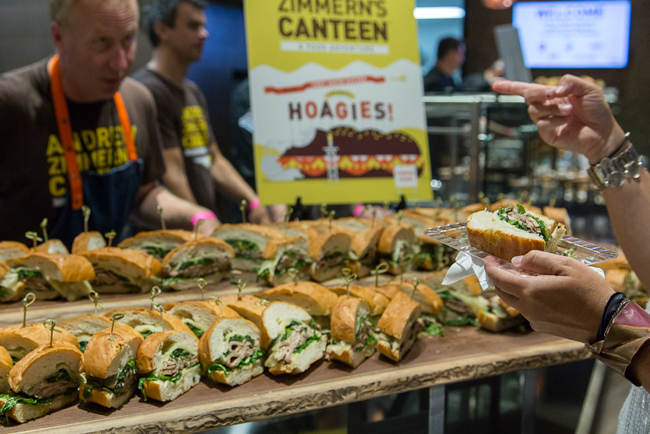
ZIMMERN: Wait till you have it on the right bread — we thought it might be fun, for a press presentation, to do it in a party hoagie style — but we have a custom-made roll, with a custom-made flour blend, and it’s not just wheat flour, to get a great roll. I can’t wait. Wait till you try the other ones we have coming.
HEAVY TABLE: So I want to talk more about those things, but I want to know what the challenges for you are in this space — it’s a massive challenge. I don’t think it’s fair, in some ways, to expect that this sandwich is going to be one of the best things someone’s ever eaten —
ZIMMERN: Why not?
HEAVY TABLE: Because I think our expectations as eaters have always been calibrated to be so low in environments like stadiums, right? And I know that you want to shore that up —
ZIMMERN: Correct, and that’s why.
Hot Chocolate at the Super Bowl
HEAVY TABLE: So tell me about how you think you’re going to be able to do that, and how you and your company’s new brand push that forward and make it all work.
ZIMMERN: I went into television because I wanted to spread my message to the most people possible. I looked at the food landscape and I thought about where I could intersect with the most people, regardless of class, privilege, circumstance — not in a restaurant, necessarily! Where is there a place that has tremendous problems? Where are there the most arguments about food? And I thought to myself: sports stadiums. Here is an environment where I’m overpaying for everything.
HEAVY TABLE: Right. And it’s all shitty.
ZIMMERN: My $10 parking spot is $25. My seat that should be $15 is $95. My hot chocolate — I go to the Super Bowl every year, because let’s remember that I’m a [sarcastic voice] globally popular celebrity —
HEAVY TABLE: Oh, you can remind me as often as you like!
ZIMMERN: This is the kind of humor and sarcasm you say to someone that never comes across in print, and people will be like, “Oh, huge douchebag!” [laughter] … so you have to include my, my sarcasm —
HEAVY TABLE: I’ll do my best —

ZIMMERN: So I was at the Super Bowl two years ago in New York. It was the third quarter. And I decided to buy a hot chocolate because it was like 48 degrees, but it was wet and misting, and as the sun set, my friend and I were wet and cold. So I ordered two hot chocolates. How much do you think two hot chocolates where at the Super Bowl? 12-ounce cup, and it was a supermarket-brand powdered mix.
HEAVY TABLE: I’m guessing fifteen bucks.
ZIMMERN: It was 20 bucks. $40 for two hot chocolates.
HEAVY TABLE: You’ve got to be shitting me.
ZIMMERN: Oh, and you couldn’t get food there. It was all prefab. So I turned to my friend, who happens to be my business partner and manager, and I said OK: They’ve known for a year, two years, wait — FOUR years that the Super Bowl was going to be played here. This was like a spiritual moment for me. And the food company managing Giant Stadium knew that it would be a sellout — Super Bowl always is — they knew it would be a sellout plus ten thousand, with extra seats and everything all over the stadium, right? So they had four years to plan for this. How on God’s green earth can they fuck that up?
In terms of lines, in terms of — if you were a restaurant, you would have a staff meeting, and you would say: OK. We can’t do our regular menu for that many people. What can we do that would be prefab and made ahead? Let’s not do pizza slices. Let’s do a thousand calzone. Let’s do hand pies; its going to be cold out. Let’s do these drinks, etc. I mean it’s a huge food company; they have a lot of choices — yes, you can keep some of your regular stuff, but you know, it’s like why are there lines 45 minutes long? Why does it have to be so expensive? Why does it have to be made three days ago and microwaved?
So, I turned to my friend — at this point, we only had AZ Canteen, it was a truck, and I had a cart at Target Field. Sold the truck; decided to focus on food in stadiums and solve this problem. It is a profound, profound challenge. I know that the number of shitty sandwiches that come out of my group is — anything above zero is unacceptable to me. I come from a world in television where I write and edit and control, I mean … I don’t fuckin’ do a VO [voiceover] until that thing is as good as I can get it. In my other businesses: same thing. If it’s worth doing, it’s worth doing right. So anything north of zero, is, to me, inexcusable. Why should I disappoint the customer? They’re paying $14.95 for that sandwich. And I know we’re disappointing people — let’s make up a number and say 15 percent of the sandwiches [being served at Target Field] are wrong. We’re gonna drill that down, we’re gonna keep idiot-proofing it, we’re gonna keep developing, devising sandwiches that work. You know?
HEAVY TABLE: Sure.
ZIMMERN: Thank God for social media —
HEAVY TABLE: It keeps you honest —
ZIMMERN: No, I’m going to let you in on a little secret you can share with your readers. I purposely redesigned the sandwich in terms of process so that when someone posts a picture of it, I can tell whether it was made right or wrong.
HEAVY TABLE: Which sandwich are we talking about?
ZIMMERN: The, uh, Korean Fried Chicken.
HEAVY TABLE: So you created a kind of “tell” in the sandwich that would signal to you if it was made wrong?

ZIMMERN: Correct. So, like, the sandwich we just ate [at Revival] had pickles on it, but you can’t tell unless you lift the bun. So, if I were redesigning that sandwich, and the pickles were the problem, I would put the pickles — I’m just making this up — I’d maybe put the pickles toothpicked on top, so that if anyone posts a photo of it, I can see if the pickles were forgotten or not. We did something like that with this one, and it’s amazing, because people take pictures of it all the time — and I send the pictures to the people running Passport Hospitality, which owns AZ Canteen, and I can tell them they’re not making the sandwich right. So it’s like free secret shoppers. And now we’re testing a lot of new stuff for U.S. Bank Stadium, and we’re learning a lot — and also, the food companies you work with all are different — some care about food more than others.
HEAVY TABLE: Sure, each has their own procedures, staffing, sourcing, priorities. It must be insane to navigate. It sounds like you’re the type of person who relishes a challenge, so maybe this is right up your alley.
ZIMMERN: No, what you meant to say is that it sounds like a nightmare; it’s too much work for not enough profit — why bother? I have a very serious endgame. It will be worth it when I have kiosks in 100 stadiums, airports, movie theaters and malls around the country, or 200, or 300.
HEAVY TABLE: So is it safe to say that these first couple of stadium ventures, for you, are like learning laboratories to figure out how you can scale up?
ZIMMERN: Correct. Correct. I teach entrepreneurship at Babson College. And one of the things that Len Schlesinger, one of my mentors, taught me many years ago was: Don’t start a business with a business plan. Start a business, and start a business. And then six months into it, figure out the business plan, because then you’ll know a lot more about what works and what doesn’t. So, we’re using these [stadiums] as incubators. We’re using them to learn about which partners we like working with better.
We’re using this for a thousand and one good reasons — I think in Aramark [U.S. Bank Stadium], we have a partner who’s super committed to food quality; I think in Delaware North [Target Field], we have a partner who is super committed to quality, and they’re still trying to figure out Target Field, the numbers, which I’m sure are slaying them. They’re in their own bear trap. These companies, I think, to survive, need to start employing a different level of expert. I’m not talking about the person flipping the burgers. I’m talking about in booths, having personnel to manage and supervise them, which not all do. We’re building that into our contracts moving forward, but if I can get this as right as I can in the worst environment, then I can pull it out into malls, and airports. It’s going to be an awful lot easier.
A Much Deeper Commitment to Food
HEAVY TABLE: I will say that the U.S. Bank event — I’m a cynic — I do some food writing around town, but I’m not like an established food scene person. So these press events — Target Field was my first experience at a food media preview event for a stadium. The event itself is hilarious in a lot of ways —
ZIMMERN: Oh, it’s ridiculous.

HEAVY TABLE: But I think as far as these events go, the U.S. Bank Stadium event was far more polished, and they’ve clearly made a much bigger commitment to local Minnesota businesses —
ZIMMERN: They’ve made a much deeper commitment to food, and here’s why — and this, I think Delaware North understands now. They didn’t understand it seven or eight years ago. U.S. Bank Stadium’s food has been developed over the past year. 2016 is a lot different than things were the year before Target Field opened. People want good food. And they want it to be the same as the good food — do you think someone who eats the chicken sandwich here [Revival] for $12 at lunch, is going to accept a worse version at $16 from the Revival booth at the stadium? I don’t think so. How angering is it for the average parent to pay $6 for a soda for their kid, or $9 for a fucking ice cream cone? So the hot stuff you buy, you’re getting raped. So when they buy our sandwiches, it had better be fucking perfect. The rotisserie had better be fucking perfect!
HEAVY TABLE: I’m looking forward to trying the rotisserie — how did that partnership between you and Gavin Kaysen come about?
ZIMMERN: Gavin and I have a relationship that predates his moving to the Twin Cities. We’ve been friends for a long time; we talked for a long time as he was thinking about moving. I became an investor [in Spoon & Stable]. He decided to move here, which I thought was smart. If you stay in New York, you’re gonna pay so much in rent that you’re just in business to pay your landlord. I mean, come here [to Minneapolis], have a life with your wife and two young kids, and travel to New York as often as you want —
HEAVY TABLE: Sure. I mean, I’m a musician. I’ve known some artists who have gone out there, and just get lost and subsumed by costs —
ZIMMERN: Yeah. And the model used to be, like Frank Sinatra sang, “If you can make it here, you can make it anywhere.” That is no longer the case, at all. You can make it anywhere, and very successfully. So, I think Gavin smartly said, “It’s time for me to go out on my own, do it in my hometown,” and I invested, and I was very flattered when I was asked to be on his very small board of directors for his master company, Soigné Hospitality. He’s one of the country’s best chefs, no doubt about it. He’s an amazingly personable and nice guy. What nobody realizes is what a great businessperson he is, and what a great team leader he is. And, when he was thinking of moving here, I said to him, “I have this contract with Aramark for when the stadium opens — you and I should really do something together here.” Just fun — fun things for two food friends to do together, and who have enough weight to make it happen.
HEAVY TABLE: Aw, food friends!
ZIMMERN: So that’s what we did. We started this thing, and I am just so excited. Several of the things we’ve concepted — and it goes beyond just what we’re doing at the stadium — are going to make for great brick-and-mortar concepts. I think that we’re building a cooperative infrastructure housed within my Passport Hospitality company to handle his, and I think it’s going to be really, really slick. I think it’s a one-plus-one equals three kind of relationship. But it’s really — and I know it sounds dorky — just two friends on the phone at night, five years ago, saying “Yeah, we should do that!”
HEAVY TABLE: The one thing I was struck by the most at the U.S. Bank Stadium food preview event was the high representation of local food businesses owned by women of color. It was astonishing to me — and it’s such a bummer that such a thing has to be astonishing — but the food world has been dominated by white men for a long time. It seems like making space and creating these opportunities for people who don’t normally get past that ceiling is a really great thing. So I was encouraged to see that. What do you think about that?
ZIMMERN: I don’t want to pat myself on the back, but I said in several interviews three or four years ago: Sit tight; relax; it’s going to happen — because for the most part, women instinctually make better leaders and better chefs than men do. So, I think a lot of that has to do with Venus / Mars issues that I believe in: Women are more patient; they problem-solve a different way; they understand the concept of “team” a little differently.
Men have a certain “Hey, how much do you bench press?” sort of relationship with other men at first, it’s alpha-male, chest-thumping. At a certain point in our food world, all people are going to care about is excellence. That’s all that matters. And at that point, the old-boy network is literally just going to dis-a-fuckin’-ppear. And I think, personally, we are in the middle of a 10-year social justice movement — and so the reason it looks queasy, looks transitional, is because it is. We’re in the middle of it.
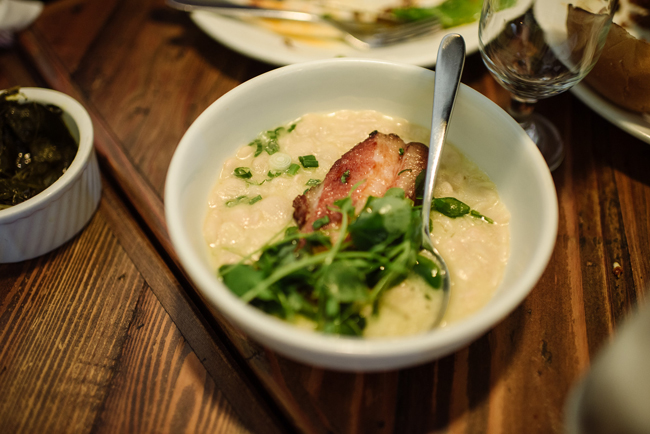
HEAVY TABLE: The lid is getting pulled off all this —
ZIMMERN: Right. When you can’t see the land on either side, it’s like crossing an ocean — so we’re in the middle of this voyage, to repair this problem. We can’t see either end, so no one knows where you’re going. And I can only tell you that at the end of the day, all people care about is what’s on the plate. And we’re going to generationalize ourselves out of this very shortly — there are some young women chefs, you know — Jessica Largey, Daniela Soto-Innes — and I’m just picking out of L.A. and New York because I’m going to say, “and all those other female chefs in between.” It is going to be so different 3 or 4 years from now. Excellence and expertise is going to become more highly valued than hiring your friends.
HEAVY TABLE: I think I agree with you from the market perspective — that in the end, all people care about is what’s on the plate. But I do think that, as we were talking about earlier in regards to the world of food being more spotlighted than it’s ever been in history, which you’re a part of — I don’t know that an Andrew Zimmern could have existed 25 years ago, or a personality like you — I do think that people are increasingly concerned about who’s making their food, and where it’s coming from, than they ever have been before, and think about issues like cultural appropriation, or how most of the supporting staff in the industry are immigrants, and if there will be a sea change in how these things are thought about as well.
“Just because food is honest and authentic doesn’t make it good.”
ZIMMERN: Look. Just because food is honest and authentic doesn’t make it good. OK? If something can be honest and authentic, and from the heart, that’s great — it still doesn’t make it good. But if it also happens to be good? That’s a fucking home run. Right? Just because Michael White was born in Beloit, Wisconsin doesn’t mean he’s not one of the best Italian chefs in the world. Which he is. Just because Rick Bayless happens to be an old white dude doesn’t mean that he’s not one of the best Mexican chefs in the world. I would put some of his food up against any — I mean, I doubt there are very many old white guys like me that have eaten as much Mexican food in every region and city in Mexico. Homes, markets — I mean, my job afforded me the opportunities over the last couple dozen years to —
[Unbidden, our server delivers dessert: butterscotch pie with crushed pretzel crust, and blueberry pie with toasted coconut. She also delivers the check, which Zimmern won’t allow me to touch.]
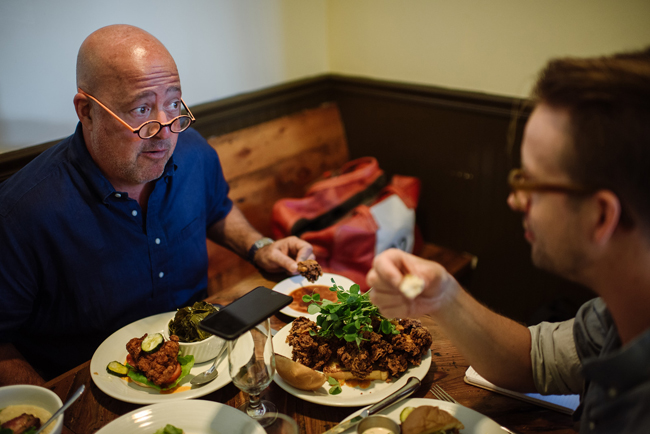
ZIMMERN: Oh, this is fantastic. Thank you. Do not take his card!
HEAVY TABLE: I won’t do the Minnesotan thing and argue [the check] to death.
ZIMMERN: Yeah, don’t do that. [To server, after seeing that the bill was fully comped] Can you put the iced tea on that bill so I can leave a gratuity for the hard-working staff here? And tell the people who are running this place to go fuck themselves — but, much appreciated.[Laughter] So I think the whole question of honesty and authenticity gets really clouded about who gets to cook what, and where, but I will say this: I think our whole viewpoint about how that works is changing. The world is getting so flat. I want to relate it back to your point before about, you know, where are women? Where are people of color? Where are people of color on TV doing food? Name one!
HEAVY TABLE: I’ve got one.
ZIMMERN: Who?
HEAVY TABLE: Russell Jackson.
ZIMMERN: OK, he’s one. There are three or four. It is a tiny blip on the radar screen of the food world. It’s — I don’t understand it. Here is what I do understand: I can only be responsible to a certain degree for myself, which is why I take what I do so fucking seriously. My show is purposely about going into fields and farms and restaurants and little cities in Central Asia, and the slums of Johannesburg, and the favelas of Rio, and the South Side of Chicago, and every place no one else will do it — to show people the power of food and connection. And that’s why I do it, because the system is so fucked up. That’s why I’ve been doing it for 14 years on TV — 10 plus years with Bizarre Foods, with almost 300 episodes.
[Our server returns]: I gave Chef your message, and he said he’d get right on it.
ZIMMERN: Good! Tell him to go back and like, make a lute, or you know, whatever he’s been doing in his spare time. Anyway, I’m very proud of that [300 episodes]. I think the importance of showing women cooking in tribal situations is crucial for the American public to see. I mean, on a thousand different levels, it’s important. So that’s why I do what I do! This butterscotch pie is sick, by the way. Sick in the way the kids say it.
HEAVY TABLE: Damn. It’s really good. So, I’ve always appreciated the balancing act struck in your show — I think it’s easy for people to just assume it’s more about novelty than substance, but it seems to be far more about pulling the curtain back and showing people and cultures that a lot of folks would never see otherwise.
“I have never faked anything.”
ZIMMERN: I went to sell this show [Bizarre Foods] 13 years ago, and I couldn’t. And eventually a very smart TV executive named Pat Young, who now works for the BBC and used to work at Travel Channel — he said to me, “You’ve got a great show, and you’re the right guy for it. You can make eight episodes and put them on PBS, and you’ll be very successful, your friends and peers will applaud, and then no one will ever hear from you again.” He said that if I was willing to flip the entertainment-to-intelligence ratio completely around — I was 75 percent intelligence and 25 percent entertainment — if I flipped that, and if I went and got a production company that would work with me, then I’d have a winning formula. So that’s what I did. Now, it was also a Trojan horse — I knew in talking to a lot of friends, agents, and managers that if I did a show that was all about “watch the fat white guy go eat bugs around the world,” I might be able to drive a successful enough formula, where in my second or third year on TV, I’d have the audience and leverage to start to change what I’m doing and how I’m doing it.
So now we make a show where I won’t do stand-ups. I won’t do that goofy handshake thing on TV. I mean the last three years, I haven’t shaken anyone’s hand on TV, it’s just like — we just come up into the scene. There’s been lots of changes. The level of intelligence, the quality of the writing and the shooting, and most proudly, and the thing no one believes is true, is that among 275 episodes of Bizarre Foods alone, or whatever the number is now, I have never faked anything. And that’s been very hard on us. You go out, you know, to find the bacon and bean dish [points to ours on the table] and they don’t have it that day. So maybe you eat and talk about it, and come back the next day when they have it and B-roll it. That’s a very common practice, which, if you cut it together, would look like I’m eating it in the same place. Meanwhile I’m off doing a hunting segment somewhere. I’ve never done it. I mean, we discuss it all the time, it’s a consideration in the field —
HEAVY TABLE: It’s a line for you that you don’t want to cross —
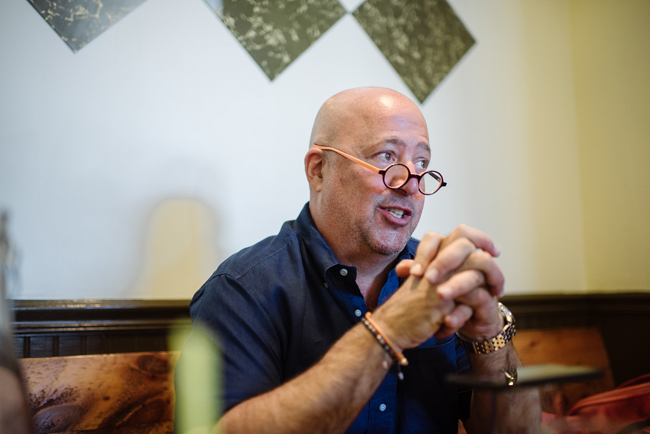
ZIMMERN: Well, you’ve got to talk about the options — it’s just like, I never want to look someone in the eye at some point when this is all over, and say, “Oh yeah, we faked that.” I’ve never faked it. So I’m really proud of that. And I think that’s important — if I want people to listen to the intelligence in the show, and understand some of the bigger concept that we talk about in the show, how can they do that if I’m faking it?
HEAVY TABLE: Sounds like you do your best to uphold your personal integrity.
ZIMMERN: Personal integrity is something you should never say to a TV person, ever. [laughter] None of us have enough personal integrity.
HEAVY TABLE [mock writing notes]: Lesson learned.
ZIMMERN: Anyone in the TV business who tells you they have some kind of personal integrity is either lying to your face, or worse: they’re so stupid, they don’t understand the world they work in. Now, sadly, I think most of it’s the latter. There’s a handful of smart people who get it, who travel in the TV space. There are hundreds of people out there, but only a handful that know what the fuck is going on. Just the truth. Most people who do what I do are mindless automatons, you know, doing something because it resonates with an audience — I mean, I don’t get it. There are some super smart people who really understand it. I think the biggest thing that most don’t understand is that the minute you take a check for working in television, even in PBS — where money does change hands — you give up a piece of your integrity. So you just can’t claim integrity. You’re selling a product to a client. You don’t have all the freedoms that you want. Some of us have more than others. Tony [Anthony Bourdain] has a lot; I have a lot; Alton Brown has a lot; Bobby Flay has a lot.
HEAVY TABLE: Guy Fieri?
ZIMMERN: Well — there’s someone who has made a very concrete decision to care about certain things and not others. He has the largest audience in TV, has made tens of millions of dollars. I think Guy is very aware of the tradeoffs he’s made. I think people like Guy would generally like to be loved by both sides of the food world. There are only — it’s impossible to say this and not sound like a douchebag, but the mom and pop in Arkansas or Kansas or middle America loves two or three people on television, and those same two or three people are also loved by globally important chefs around the world, line cooks, farmers, the people who make the food world go.
Because all those people who are actually in the industries — plural — look at a lot of people and say “Oh, that person’s full of shit,” or “Why are they using commodity pork?” or “Why are they promoting that restaurant, that product? …” I think people like Bourdain and myself and Alton Brown have a lot of gravitas with both the entertainment side of the fan base and the people who are actually in the industries that you’re making TV about. Nobody — I mean, a lot of people don’t like Tony’s show. A lot of people don’t like my show — but I never see anything on Twitter or Instagram that says we don’t know what we’re talking about when it comes to these things.
HEAVY TABLE: I’m curious — I’m sure you get bombarded with requests, you know, to promote products, to do this or that — what are your hard lines you will not cross?
ZIMMERN: It depends on what bills I have that month. [laughter]
HEAVY TABLE: So you’ve already sold your soul, you’re done —
ZIMMERN: Yes. I work for a commercial television station. I’ve already — look, most people aren’t honest enough to actually look you in the eye and say that.
HEAVY TABLE: Well, thanks for being honest!
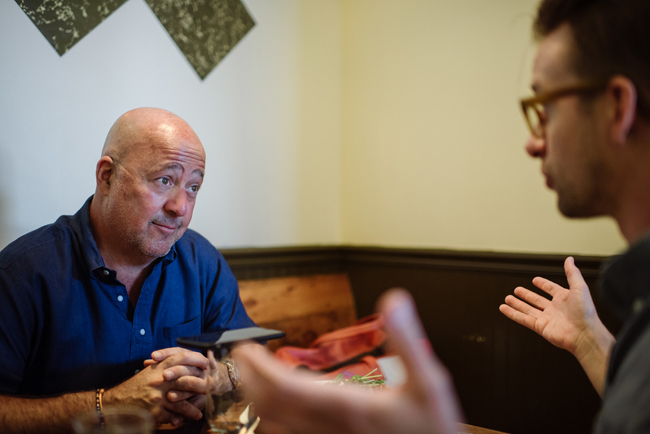
ZIMMERN: Now, I will not, you know, do work for Swift Pork. There’s going to be more formal announcements about it, but I am the food coach in residence, if you will, at General Mills. A company that’s trying to change its image. And I purposely use the word “image” because they’re in the middle of changing all their products, which will take them 20 years. They can’t just flip a switch. But they’re smart enough to know that internally, on their own, they don’t necessarily have the all the opinions, or someone who will look them in the eye to say “That’s bullshit, and America’s gonna tell you that it’s bullshit.” So, I have no problem working with them because for 30 years, I was like Michael Moore, screaming from the outside of the building, and no change was made — Big Food is not our enemy. Certain companies don’t get it. General Mills is a local one that gets it.
HEAVY TABLE: When a company that large makes a small change, it can have a massive ripple effect.
ZIMMERN: Exactly. And who else is going to help us feed the world? General Mills, for — I don’t know, decades — had the same corporate mission statement. And they just changed it last year. And most people didn’t notice the announcement. But it’s very important, and I’m going to get one word or so wrong, but you can look it up, but basically it’s to serve the world through food and love. Serve, food, and love are in there. Now, in the 1940s those words were in their mission statement, but as it became a giant brand company, it got lost. They’re making food for people to eat with their families. What’s more intimate than that? What’s better than Hamburger Helper? Nothing! I’m talking philosophically. Eating well in America is a class issue. If you can find a healthy way to dehydrate vegetables, add them to noodles, mix in lean, quality meats — which, by the way, they’re not responsible for but could suggest, I’m just talking about ways you change that — it becomes a skillet dinner that we all made, loved, and if I made it at my house for you, you’d go, “Oh my god.” It’s comfort food heaven. So why is Hamburger Helper decried? Well, because of certain ingredients that are in it, quality of this, chemical that —
HEAVY TABLE: The association with the industrial.
ZIMMERN: Correct. So if these big food companies are to survive, they have to change how they’re viewed and how they do business. General Mills gets it. I am so proud to be associated with them — the net result will be to change the lives of hundreds of millions of people around the world. Now, I have other friends that want to change those lives by doing something hyper-local. That’s great! I’m a globalist, so I choose to do it with them [General Mills]. But I’m not ashamed of that — I’m really super proud of it. And the same day I’m working for them, I’m also on TV in a farm in South America showing people someone who is taking nutrient-dense grains and sprouting them the way native peoples have for thousands of years, in the hope that it influences someone to do the same thing right here. I got no problem with where my head hits the pillow at night. I really believe in what I’m doing, I believe in the higher purpose of it. I make an entertainment show, and I serve food in stadiums, and other people use words like “thought leadership” or crap like that. Oh, what do you do? “Oh, I’m a ‘thought leader,’” and I’m like, that’s great! And I hope you get popular enough to effect change. All I’m interested in is results. And I have a lot of goals that I need to realize over the next 15 years. You know, I’d like to have it all when I’m 70, live on an island or whatever, but I’m 55, and I want to see certain things come home to roost over the next 15 years.
HEAVY TABLE: When you were a young chef, did you ever think you’d be in the position you’re in today?
ZIMMERN: Yes. My parents taught me to believe that anyone can be president, that you can do what you want. My drug addiction and my alcoholism caused me to lose a decade. You know, it’s — I mean I’ll never get that back. At 25 years sober, I’m trying to make up for lost time. There’s so much more I want to do, you know? And I think the digital medium — it’s why I started a production company here — I believe that spreading the message in that medium is where you reach the largest number of people.

Thanks for the interview. Interesting stuff here.
I gotta say, though, for a guy whose entire shtick is being open-minded about food, he sure is judgmental about people. God forbid some “stupid person” he’s never met and doesn’t know from Adam should deign to speak to him about bugs…unless that person’s got a platform of some sort, in which case AZ’ll talk about bugs for an hour.
There’s a real cultural/intellectual arrogance at play throughout this interview, as well as a lot of having-your-cake-and-eating-it-too. He’s a celebrity (just ask him) yet doesn’t want to deal with the trappings that are part and parcel. He criticizes the food industry while simultaneously cashing their checks.
The reader gets a real flavor for Zimmern the person (much different than Zimmern the personality, despite what he says) in this interview, so kudos to Heavy Table for that, and for letting the reader draw their own conclusions. Keep up the good work!
Wonderful piece.
I quit reading the interview after he repeatedly called his fans “stupid”. That’s tells me everything I need to know about this man.
Reminds me of how challenging it is for successful people to project humility, grace and class, despite the unpredictable things (and people) that happen to us every day. I’m just turning 76 and work at it every day…